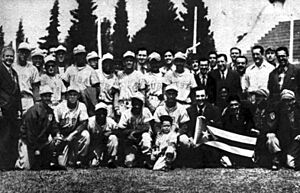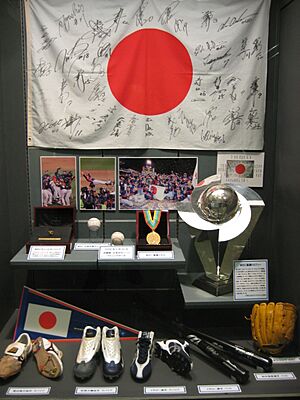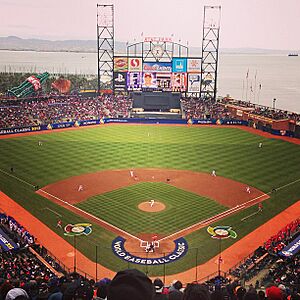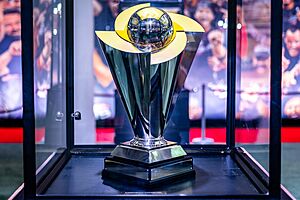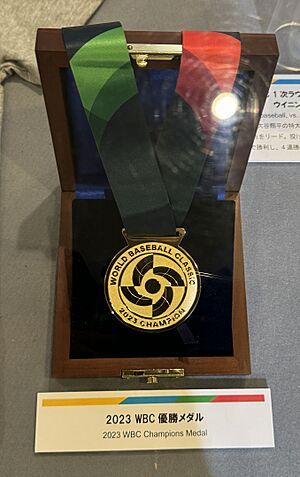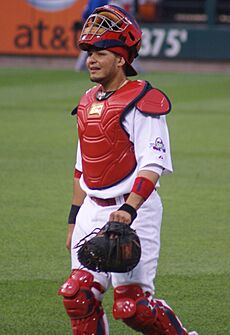World Baseball Classic facts for kids
 |
|
| Sport | Baseball |
|---|---|
| Founded | 2005 |
| Inaugural season | 2006 |
| President | Jim Small |
| Organising body |
|
| No. of teams | 20 (tournament) 8 (qualification) |
| Region | Worldwide |
| Most recent champion(s) |
JPN (2023) |
| Most titles | JPN (3 titles) |
The World Baseball Classic (WBC), also known as the Classic, is a big international baseball tournament. It is approved by the World Baseball Softball Confederation (WBSC), which is like the main group for baseball and softball around the world. Major League Baseball (MLB) also helps organize it. The team that wins gets the World Baseball Classic Championship Trophy. This tournament is special because it's the only one that gives the winner the title of "world champion" in baseball.
The idea for the tournament started in 2005. The first one was held in 2006. Before the WBC, there were other big baseball tournaments like Olympic baseball and the Baseball World Cup. The Baseball World Cup stopped after 2011. The WBSC then agreed that the WBC would be the official world championship. This was on the condition that teams had to qualify and follow international anti-doping rules.
After the first two tournaments, it was decided that the World Baseball Classic would happen every four years. The third tournament was in 2013, and the fourth was in 2017. The World Baseball Classic has been held five times so far, from 2006 to 2023. Teams from Japan, the Dominican Republic, and the United States have won the championship. Japan is the only team that has won the tournament more than once.
This tournament is the first to have national teams with professional players from the best leagues worldwide. This includes players from Major League Baseball and Nippon Professional Baseball (NPB) in Japan. The World Baseball Classic was created to let the best players compete for their home countries. It also helps make baseball more popular around the world. The 2023 World Baseball Classic was one of the most-watched sports events globally.
Contents
How the Classic Started
Before the World Baseball Classic, there wasn't a single international baseball championship for all the best players. The "world championship" was usually the Baseball World Cup. This event was held many times from 1938 to 2011. Cuba was very successful in this tournament, winning 25 times.
Baseball was also played at the Summer Olympic Games. It became an official medal sport in 1992. For a long time, the Olympics and Baseball World Cup only allowed amateur players. This meant professional players from top leagues like MLB couldn't play.
People started thinking about a tournament for professional players in the mid-1990s. In 2004, Gene Orza from the Major League Baseball Players Association pushed for it. The first tournament was announced in May 2005. Its success in 2006 led to plans for another one in 2009.
In 2013, the group that ran the Baseball World Cup joined with another group to form the World Baseball Softball Confederation. They stopped the Baseball World Cup, making the World Baseball Classic one of the two main international baseball tournaments.
What Makes the Classic Special
The World Baseball Classic is often compared to the WBSC Premier12. These are the only two major international baseball tournaments. But the WBC is the only one where the winner is called the "World Champion." This is because players from Major League Baseball, which is the highest level of baseball, play in the WBC. They usually don't play in the Premier12. This makes the WBC more important because it features the very best players.
Even though the WBSC World Rankings give more points for winning the Premier12, most people in the baseball world see the World Baseball Classic as the most important international tournament. They often call it "The World Cup of Baseball," comparing it to the FIFA World Cup in soccer.
History of the Tournaments
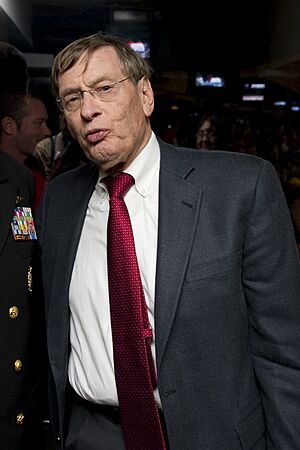
The first World Baseball Classic was announced in May 2005 by Bud Selig, the head of Major League Baseball. MLB had been trying to create this tournament for a few years. But they faced challenges from team owners and the players' union. Owners were worried about their star players getting hurt before the regular season started. The players' union was also concerned about injuries and drug testing rules.
Eventually, they agreed on insurance for player contracts and strict drug testing. MLB teams could not stop their players from joining. Japanese baseball (NPB) also had some disagreements at first. But after talks, they agreed to participate in September 2005.
Japan's Early Wins (2006–2009)
The first tournament in 2006 had 16 teams. These were chosen as the "best baseball-playing nations." There were no qualifying games. The tournament started with group play, then moved to single-elimination semifinals and finals.
South Korea won their first game against Chinese Taipei. South Korea reached the semifinals without losing a game. But they lost to Japan in the semifinal. Meanwhile, Cuba beat the Dominican Republic in the other semifinal. Japan and Cuba then played in the final.
Japan's pitcher, Daisuke Matsuzaka, pitched well in the final. Japan's hitters, like Ichiro Suzuki, scored runs. Cuba fought back, but Japan won the game 10-6. This win was important for Japan and showed the world the WBC was a big deal. Matsuzaka became a star and later joined the Boston Red Sox.
The next tournament in 2009 had the same 16 teams. The format changed to a "modified double-elimination" for the first two rounds. The semifinals and final were still single-elimination. The Netherlands surprised everyone by beating the Dominican Republic twice to reach the second round.
In the semifinals, South Korea beat Venezuela. Japan beat the United States. South Korea was the home team for the final. Japan scored first, but South Korea tied the game. Japan took the lead again, but South Korea tied it in the ninth inning, sending the game to extra innings.
In the tenth inning, Ichiro Suzuki hit a key single that scored two runs for Japan. Japan's closer, Yu Darvish, then finished the game. Japan won 5-3, successfully defending their 2006 championship. Daisuke Matsuzaka was named the tournament's Most Valuable Player (MVP) for the second time.
Dominican Republic's Undefeated Run (2013)
The 2013 tournament was the first to include a qualifying round. This meant some teams had to win their way in. Brazil and Spain joined the tournament for the first time. The first round used a round-robin format again.
The championship game was between two Caribbean teams: the Dominican Republic and Puerto Rico. The game was played in San Francisco. The Dominican Republic scored early. Their pitchers, including starter Samuel Deduno and relievers, kept Puerto Rico from scoring any runs.
The Dominican Republic won 3-0. They finished the tournament with a perfect 8-0 record, becoming the first team to win the World Baseball Classic without losing a single game. Robinson Canó was named the MVP for his excellent hitting.
USA's First Title (2017)
The 2017 tournament went back to the 2006 format for the first two rounds. Colombia and Israel qualified for the first time. Team Israel, ranked 41st in the world, was a big surprise.
The defending champion Dominican Republic had an 11-game winning streak. But they were eliminated in the second round. The United States won its first WBC championship. They beat Japan in the semifinals and Puerto Rico in the finals. Puerto Rico had reached the final without losing a game.
In the final game, Marcus Stroman pitched for the United States. He didn't allow any hits for the first six innings. The United States scored runs with hits from players like Ian Kinsler and Christian Yelich. The United States won 8-0, shutting out Puerto Rico. Stroman was named the tournament's MVP.
"Baseball's Already Won" (2023)
In 2020, it was announced that the 2021 WBC would have 20 teams. But the tournament was postponed due to the COVID-19 pandemic. The 2023 tournament took place from March 8 to March 21, 2023.
Many MLB stars decided to play in the 2023 Classic. For Team USA, players like Mike Trout and Trea Turner joined. The Samurai Japan team also had many stars, including Shohei Ohtani and Yu Darvish. Many people thought this was the strongest Japanese team ever.
The United States beat Venezuela to play Cuba in the semifinals. Japan faced Mexico, who had a surprising run in the tournament.
In the championship game, the United States played Japan. This final was incredibly popular in Japan, with over 54 million viewers. In the bottom of the ninth inning, with Japan leading 3-2, Shohei Ohtani was pitching for Japan. His teammate from the Los Angeles Angels, Mike Trout, was batting for the US. It was a dramatic moment. Ohtani struck out Trout to seal the victory for Japan.
Japan won the championship without losing a single game, just like the Dominican Republic did in 2013. Japanese Prime Minister Fumio Kishida congratulated the team.
The Next Tournament (2026)
The next World Baseball Classic will be held in 2026. Sixteen teams from the 2023 tournament automatically qualified. The other four teams will be decided through qualifying games in 2025.
The pool play rounds for 2026 will be in Miami, Houston, San Juan (Puerto Rico), and Tokyo. The quarterfinals will be in Miami and Houston. The final round will be played in Miami.
How the Games are Played
The World Baseball Classic happens in March. This is when most professional baseball leagues, like MLB and NPB, are in their pre-season (spring training). Games are played in indoor domes or outdoor stadiums with warm weather.
| Rank | Country (or possession) | % | |||||
|---|---|---|---|---|---|---|---|
| 1 | United States | 1,057 | 70.7% | ||||
| 2 | Dominican Republic | 171 | 11.4% | ||||
| 3 | Venezuela | 106 | 7.1% | ||||
| 4 | Cuba | 33 | 2.2% | ||||
| 5 | Puerto Rico | 28 | 1.9% | ||||
| 6 | Mexico | 24 | 1.6% | ||||
| 7 | Canada | 15 | 1% | ||||
| 8 | Colombia | 13 | 0.9% | ||||
| 9 | Panama | 9 | 0.6% | ||||
| 10 | Japan | 7 | 0.5% | ||||
| 11 | South Korea | 6 | 0.4% | 12 | Curaçao | 5 | 0.3% |
| 13 | Australia Germany |
3 | 0.2% | ||||
| 15 | Multiple | 2 | 0.1% | ||||
| 18 | Multiple | 1 | 0.1% |
Many top baseball players join the tournament. In 2006, stars like Derek Jeter and Ken Griffey Jr. played. From Japan, Daisuke Matsuzaka and Ichiro Suzuki were on the team. Other famous players from Cuba and the Dominican Republic also participated. The 2009 Classic also had many well-known players.
For the 2013 tournament, some Japanese players first thought about not playing. But they later agreed after a deal was made about money. Even so, some key players from 2009, like Yu Darvish, did not play. However, many other famous MLB players, such as Miguel Cabrera and Robinson Canó, did join their national teams.
In 2017, former All-Stars like Adam Jones and Buster Posey played for the United States. For the Dominican Republic, stars like Adrián Beltré and Manny Machado participated. Puerto Rico had rising stars like Javier Báez and Carlos Correa.
In 2023, the US team included many All-Stars like Mike Trout and Mookie Betts. Players like Lars Nootbaar and Tommy Edman played for Japan and South Korea, honoring their family heritage. Randy Arozarena, who is Cuban, played for Mexico after becoming a legal resident there.
Player Eligibility
A player can play for a World Baseball Classic team if they meet certain rules:
- They are a citizen of that country.
- They can get citizenship or a passport for that country.
- They are a permanent legal resident of that country.
- They were born in that country.
- One of their parents is (or was) a citizen of that country.
- One of their parents was born in that country.
Pitching Rules
Pitchers have limits on how many pitches they can throw in a game:
- Qualifying Round: 85 pitches
- First Round: 65 pitches
- Second Round: 80 pitches
- Championship Round: 95 pitches
A pitcher can finish batting against a player even if they reach the limit. But they must leave the game after that batter.
Mercy Rules
To keep games from being too one-sided, some games end early if one team is far ahead. These "mercy rules" do not apply in the knockout stage (semifinals and finals).
Designated Hitter
The designated hitter rule is used in all games. This means a player can bat without playing a defensive position.
Extra Innings
From 2009 to 2017, if a game went into the 11th inning or later, teams would start with runners on first and second base. This rule was put in place to help games end faster. In 2023, this rule changed to match Major League Baseball rules.
Video Replay
Starting in the 2023 World Baseball Classic, teams can use video replay to review plays, just like in a Major League Baseball game.
Tie-breaking Rules
In the WBC, how many runs a team wins by can be important if teams are tied in the standings. Teams are ranked by "Team Quality Balance." This rewards teams for scoring many runs and for getting fewer outs when they are batting in the bottom of an inning. This rule caused some problems in 2013, leading to a small fight between the Canadian and Mexican teams.
These tie-breaking rules were changed in 2017. Now, teams are ranked by "fewest runs allowed per inning of defense in head-to-head games." This still encourages teams to score many runs and allow very few.
Who Participates
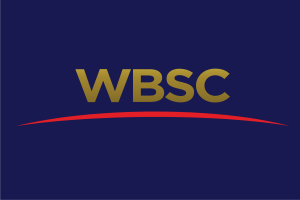
The first two Classics had 16 invited teams. A qualifying round was added for the 2013 tournament. This allowed new countries like Brazil and Spain to play. So far, seven new nations have played in the tournament because of the qualifying rounds.
For the 2013 and 2017 WBCs, the top 12 teams from the previous tournament automatically qualified. The four teams that finished last in their groups had to play in the qualifying round. This round had four tournaments, and the winners got the last four spots in the main tournament.
The 2023 WBC expanded to 20 teams. All 16 teams from the 2017 WBC automatically qualified. The qualifying round for 2023 had two tournaments with six teams each. The top two teams from each tournament advanced to the 2023 WBC.
Broadcasting and Fans
The World Baseball Classic is one of the most-watched baseball events globally. The 2023 tournament was shown in 163 places and in 13 languages. In Japan, almost 100 million people watched the WBC in 2023. Over 55 million watched the final game when Shohei Ohtani struck out Mike Trout.
The tournament is very popular in the Caribbean, Central America, and South America. It's often called "Clásico Mundial" there. The games between the Dominican Republic and Puerto Rico are a big rivalry, called "El Clásico." In 2023, 62% of homes in Puerto Rico watched the game between Puerto Rico and the Dominican Republic.
Attendance Numbers
Here's how many people have attended the World Baseball Classic tournaments:
| Year | Total attendance | # games | Avg attendance |
|---|---|---|---|
| 2006 | 737,112 | 39 | 18,900 |
| 2009 | 801,408 | 39 | 20,549 |
| 2013 | 781,438 | 39 | 20,037 |
| 2017 | 973,699 | 40 | 24,342 |
| 2023 | 1,165,857 | 47 | 24,805 |
And here are the attendance numbers for the qualifying rounds:
| Year | Total attendance | # Games | Avg attendance |
|---|---|---|---|
| 2013 | 103,774 | 24 | 4,324 |
| 2017 | 111,795 | 24 | 4,658 |
| 2023 | 26,080 | 18 | 1,449 |
| 2026 | 157,799 | 14 | 11,271 |
Game Locations
Unlike other tournaments that have one host country, the WBC uses many hosts around the world. So far, seven different countries have hosted games. Each tournament has had games in Asia, Latin America, and the United States. However, the championship round has always been held at Major League Baseball stadiums in the United States.
| Round | 2006 | 2009 | 2013 | 2017 | 2023 | 2026 |
|---|---|---|---|---|---|---|
| Qualification | ||||||
| Pool stage | ||||||
| Knockout stage | ||||||
| Championship |
Tournament Results
- Keys
- F/N: result/match won after extra innings or mercy rule, where N is the total number of innings in the match
- TBD: to be determined
| Ed. | Year | Hosts | First place game | Semi-finalists | T | |||
|---|---|---|---|---|---|---|---|---|
| Champions | Score | Runners-up | Third place | Fourth place | ||||
| 1 | 2006 | Japan |
10–6 Petco Park, San Diego |
Cuba |
South Korea |
Dominican Republic |
16 | |
| 2 | 2009 | Japan |
5–3 (F/10) Dodger Stadium, Los Angeles |
South Korea |
Venezuela |
United States |
16 | |
| 3 | 2013 | Taiwan |
Dominican Republic |
3–0 AT&T Park, San Francisco |
Puerto Rico |
Japan |
Netherlands |
16 |
| 4 | 2017 | United States |
8–0 Dodger Stadium, Los Angeles |
Puerto Rico |
Japan |
Netherlands |
16 | |
| 5 | 2023 | Taiwan |
Japan |
3–2 LoanDepot Park, Miami |
United States |
Mexico |
Cuba |
20 |
| 6 | 2026 | Puerto Rico |
To be determined | To be determined | 20 | |||
Team Performance
| Team | 2006 (16) |
2009 (16) |
2013 (16) |
2017 (16) |
2023 (20) |
2026 (20) |
Total |
|---|---|---|---|---|---|---|---|
| AUS | R1 13th |
R1 12th |
R1 16th |
R1 9th |
QF 7th |
Q | 6 |
| BRA | × | × | R1 14th |
• | • | Q | 2 |
| CAN | R1 9th |
R1 13th |
R1 12th |
R1 15th |
R1 12th |
Q | 6 |
| CHN | R1 15th |
R1 11th |
R1 13th |
R1 16th |
R1 20th |
• | 5 |
| TPE | R1 12th |
R1 14th |
R2 8th |
R1 14th |
R1 17th |
Q | 6 |
| COL | × | × | • | R1 11th |
R1 18th |
Q | 3 |
| CUB | 2nd | R2 6th |
R2 5th |
R2 7th |
4th | Q | 6 |
| CZE | × | × | • | • | R1 14th |
Q | 2 |
| DOM | 4th | R1 9th |
1st | R2 5th |
R1 10th |
Q | 6 |
| GBR | × | × | • | • | R1 15th |
Q | 2 |
| ISR | × | × | • | R2 6th |
R1 16th |
Q | 3 |
| ITA | R1 10th |
R1 10th |
R2 7th |
R1 12th |
QF 8th |
Q | 6 |
| JPN | 1st | 1st | 3rd | 3rd | 1st | Q | 6 |
| MEX | R2 6th |
R2 8th |
R1 11th |
R1 13th |
3rd | Q | 6 |
| NED | R1 11th |
R2 7th |
4th | 4th | R1 11th |
Q | 6 |
| NCA | × | × | • | • | R1 19th |
Q | 2 |
| PAN | R1 14th |
R1 15th |
• | • | R1 13th |
Q | 4 |
| PUR | R2 5th |
R2 5th |
2nd | 2nd | QF 6th |
Q | 6 |
| RSA | R1 16th |
R1 16th |
• | • | • | • | 2 |
| KOR | 3rd | 2nd | R1 9th |
R1 10th |
R1 9th |
Q | 6 |
| ESP | × | × | R1 15th |
• | • | • | 1 |
| USA | R2 8th |
4th | R2 6th |
1st | 2nd | Q | 6 |
| VEN | R2 7th |
3rd | R1 10th |
R2 8th |
QF 5th |
Q | 6 |
| Team | 2006 (16) |
2009 (16) |
2013 (16) |
2017 (16) |
2023 (20) |
2026 (20) |
Total |
- Legend
- 1st – Champions
- 2nd – Runners-up
- 3rd – Third place
- 4th – Fourth place
- QF – Quarterfinals (2023–present)
- R2 – Round 2 (2006–2017: second round)
- R1 – Round 1 (2006–2017: first round, 2023–present: pool stage)
- – Relegated to qualification tournament
- Q – Qualified
- • – Did not qualify
- × – Did not enter
New Teams in the Classic
| Year | Debutants | Total | CT |
|---|---|---|---|
| 2006 | AUS, CAN, CHN, TPE, CUB, DOM, ITA, JPN, MEX, NED, PAN, PUR, KOR, RSA, USA, VEN | 16 | 16 |
| 2009 | None | 0 | 16 |
| 2013 | BRA, ESP | 2 | 18 |
| 2017 | COL, ISR | 2 | 20 |
| 2023 | GBR, CZE, NCA | 3 | 23 |
| 2026 | None | 0 | 23 |
Team Overview
| Team | Apps | Record streak |
Active streak |
Debut | Most recent |
Best result |
|---|---|---|---|---|---|---|
| AUS | 6 | 6 | 6 | 2006 | 2026 | Quarterfinals (2023) |
| CAN | 6 | 6 | 6 | 2006 | 2026 | Pool stage |
| TPE | 6 | 6 | 6 | 2006 | 2026 | Quarterfinals (2013) |
| CUB | 6 | 6 | 6 | 2006 | 2026 | Runners-up (2006) |
| DOM | 6 | 6 | 6 | 2006 | 2026 | Champions (2013) |
| ITA | 6 | 6 | 6 | 2006 | 2026 | Quarterfinals (2013, 2023) |
| JPN | 6 | 6 | 6 | 2006 | 2026 | Champions (2006, 2009, 2023) |
| MEX | 6 | 6 | 6 | 2006 | 2026 | Third place (2023) |
| NED | 6 | 6 | 6 | 2006 | 2026 | Fourth place (2013, 2017) |
| PUR | 6 | 6 | 6 | 2006 | 2026 | Runners-up (2013, 2017) |
| KOR | 6 | 6 | 6 | 2006 | 2026 | Runners-up (2009) |
| USA | 6 | 6 | 6 | 2006 | 2026 | Champions (2017) |
| VEN | 6 | 6 | 6 | 2006 | 2026 | Third place (2009) |
| CHN | 5 | 5 | 0 | 2006 | 2023 | Pool stage |
| PAN | 4 | 2 | 2 | 2006 | 2026 | Pool stage |
| COL | 3 | 3 | 3 | 2017 | 2026 | Pool stage |
| ISR | 3 | 3 | 3 | 2017 | 2026 | Quarterfinals (2017) |
| BRA | 2 | 1 | 1 | 2013 | 2026 | Pool stage |
| CZE | 2 | 2 | 2 | 2023 | 2026 | Pool stage |
| GBR | 2 | 2 | 2 | 2023 | 2026 | Pool stage |
| NCA | 2 | 2 | 2 | 2023 | 2026 | Pool stage |
| RSA | 2 | 2 | 0 | 2006 | 2009 | Pool stage |
| ESP | 1 | 1 | 0 | 2013 | 2013 | Pool stage |
Awards and Honors
Most Valuable Player (MVP)
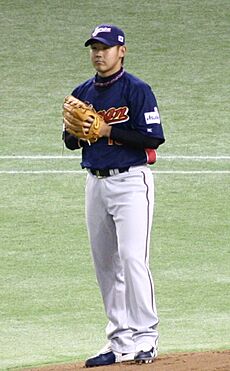
The first MVP award in 2006 went to Japan's Daisuke Matsuzaka. He pitched very well and had a 3-0 record. After this, Matsuzaka signed a big contract to play for the Boston Red Sox in MLB. He won the MVP again in the 2009 World Baseball Classic.
In 2013, Robinson Canó won MVP. He hit very well, with a .469 batting average. Toronto Blue Jays pitcher Marcus Stroman won the award in 2017 for the United States. He pitched great, including a no-hitter through six innings in the final game.
In 2023, Los Angeles Angels two-way star Shohei Ohtani was named MVP. He was amazing both as a hitter and a pitcher. He hit .435 and had a 1.86 ERA with 11 strikeouts as a pitcher. He also pitched the final inning of Japan's win over the US.
| Year | Player | Position | Nationality |
|---|---|---|---|
| 2006 | Daisuke Matsuzaka | Starting pitcher | |
| 2009 | Daisuke Matsuzaka | Starting pitcher | |
| 2013 | Robinson Canó | Second baseman | |
| 2017 | Marcus Stroman | Starting pitcher | |
| 2023 | Shohei Ohtani | Starting pitcher Designated hitter |
All-WBC Teams
After each tournament, an "All-WBC team" is chosen. These are the best players at each position. Three pitchers, eight other position players, and a designated hitter are named.
Daisuke Matsuzaka, Yadier Molina, and Javier Báez are the only players to be named to the All-WBC team twice. Shohei Ohtani is the only player to be named to the team at two different positions (pitcher and designated hitter) in 2023.
| Pos. | 2006 | 2009 | 2013 | 2017 | 2023 |
|---|---|---|---|---|---|
| C | |||||
| 1B | |||||
| 2B | |||||
| 3B | |||||
| SS | |||||
| OF | |||||
| DH | |||||
| P | |||||
Players from 12 countries have been named to an All-WBC team. Japan has the most players with 12.
| Rank | 2006 | 2009 | 2013 | 2017 | 2023 | Total |
|---|---|---|---|---|---|---|
| JPN | 3 | 3 | 2 | 1 | 3 | 12 |
| PUR | 0 | 1 | 3 | 5 | 1 | 10 |
| US | 2 | 1 | 1 | 3 | 2 | 9 |
| DOM | 1 | 0 | 5 | 1 | 0 | 7 |
| KOR | 3 | 4 | 0 | 0 | 0 | 7 |
| CUB | 3 | 2 | 0 | 0 | 2 | 7 |
| MEX | 0 | 0 | 0 | 0 | 2 | 2 |
| VEN | 0 | 1 | 0 | 0 | 1 | 2 |
| CAN | 0 | 0 | 1 | 0 | 0 | 1 |
| ISR | 0 | 0 | 0 | 1 | 0 | 1 |
| NED | 0 | 0 | 0 | 1 | 0 | 1 |
| TPE | 0 | 0 | 0 | 0 | 1 | 1 |
Top Players by Stats
These are the players with the best stats in the WBC through the end of the 2023 tournament:
|
Batting
|
Pitching
|
Images for kids
See also
 In Spanish: Clásico Mundial de Béisbol para niños
In Spanish: Clásico Mundial de Béisbol para niños
 | Jessica Watkins |
 | Robert Henry Lawrence Jr. |
 | Mae Jemison |
 | Sian Proctor |
 | Guion Bluford |


